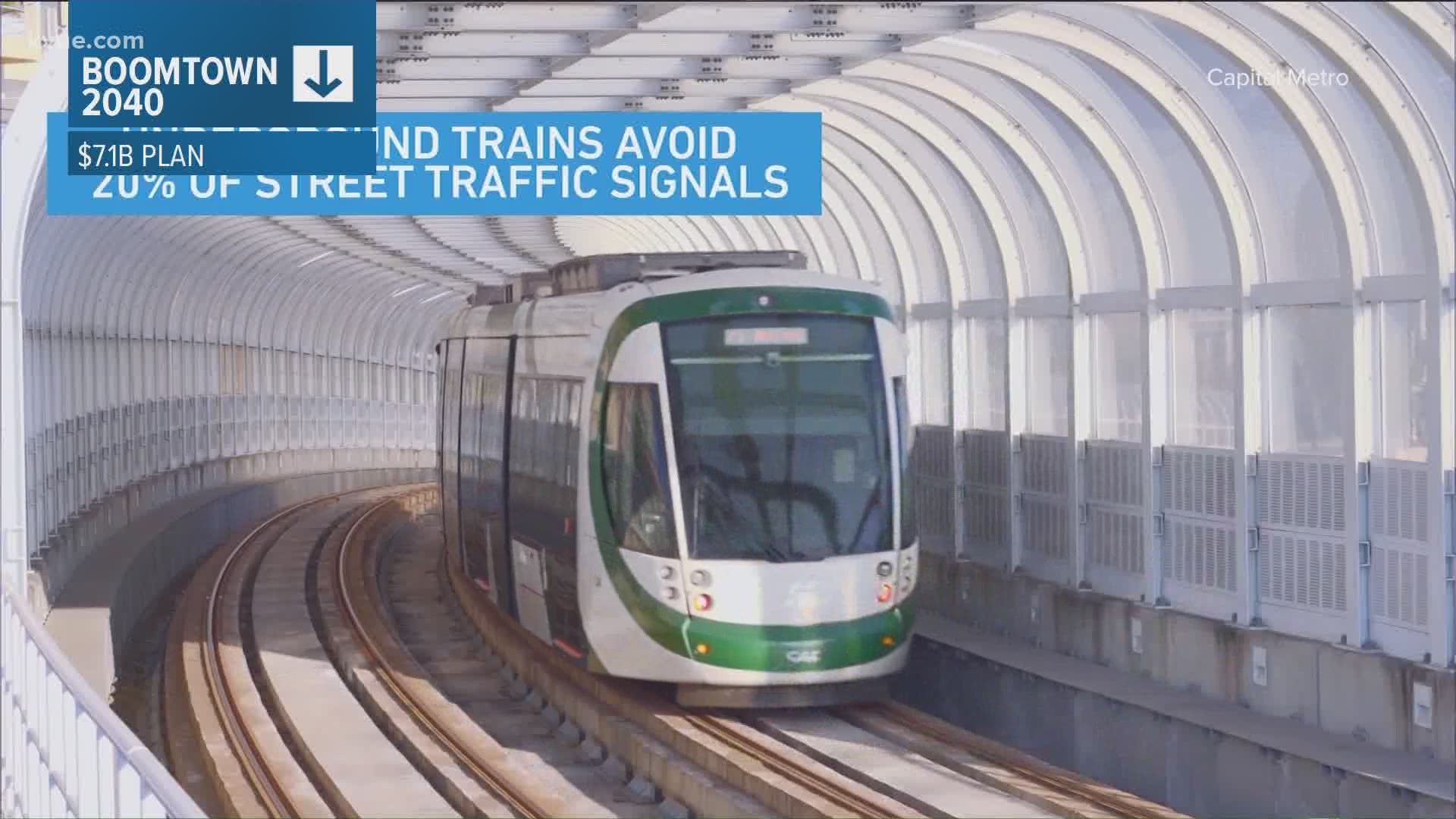AUSTIN, Texas — Editor's note: Prop A, a $7.1 billion Project Connect plan, passed in the November election. To read more on what that means for Austinites, click here.
On Nov. 3, Austin voters will choose whether to approve or reject Capital Metro’s $7.1 billion "Project Connect" transit plan. But in the months leading up to the vote, there’s been some confusion about what exactly taxpayers would be paying for and what the initial investment would yield.
To try to clear some of that up, KVUE spoke to CapMetro Board Chairman Wade Cooper.
Cooper said the initial segment of the project would be rail lines and bus rapid transit lines aimed at connecting large parts of Austin through a “pretty sophisticated, high-capacity transit system.” Cooper said the major components include:
- The orange rail line that runs from U.S. 183 and Lamar Boulevard down "through the core of the city" and then back down south, through Congress Avenue, down to Stassney Lane.
- A rail line that connects downtown to the airport and goes up to 183 and Lamar.
- Four bus rapid transit lines extending out to different parts of the city, including: the gold line, running up "basically Red River connecting [the] Highland Mall area and downtown;" a line going east; a line "basically on Burnet Road from the Domain down to southeast Austin;" and a line running down Pleasant Valley.
Cooper said that Austin doesn’t have adequate infrastructure for the population it has today and with the City’s rapid growth, the traffic issues are just going to get worse. But he recognizes that a lot of residents are concerned about the cost of the project – especially with the uncertainty brought on by the COVID-19 pandemic. However, he believes the project is necessary for the future when Austin returns to "normal."
"We know that people are going to go back, in many respects, to what they were doing before. Some will change, certainly. But if add two million people to our existing infrastructure, we’re going to have problems. It’s plain and simple, and there’s no shortcut way around that. So, I’m on the side that says we really need to plan for that, prepare for that," Cooper said.
Cooper said the cost of doing nothing at this point will cause greater affordability problems, negative environmental impacts and make it harder for Austinites to access essential services.
"There is certainly an impact when you have to drive an hour and a half to get to your job or an hour to get your kid's to school, to get to the doctor’s office," Cooper said. "One of the great things about this project that we have is it’s connecting hospitals, health care facilities. There’s something like [a] fifth, more than 50 schools, I believe, on the two rail lines. And so, if you don’t build infrastructure, if you don’t plan for the future, then you’re depriving people of essential services."
Cooper said that the proposed version of the Project Connect plan is the most feasible for what Austin needs. He said that the only way to make the City’s streets and infrastructure work better is to find a way to get more people through intersections at one time, and transit and buses do that better than cars.
He also said some other options transit experts have looked at wouldn’t last as long as light rail and rapid buses, so they ultimately wouldn’t be as good of an investment for the future.
"If you look around the world and you look at cities that have grown successfully, in London and New York and countless cities in Asia, light rail still is the workhorse. And it is still the best way to get a lot of people through a small space in a quick period of time," Cooper said. "It’s more expensive, obviously, than building dedicated lanes, but you’re building something that hopefully will last for 100 years."
RELATED: 'It is a big mistake' | Member of anti-Project Connect PAC says plan is a huge waste of money
Cooper said, economically, Project Connect would bring a lot of jobs to Austin, during construction and once the network is in place. But he believes the key economic impact of the project is getting people "connected to their jobs as our community gets more and more expensive to live" in, making it "much easier for people to get to the good-paying jobs in the core of our city."
Cooper also believes the project could have a major impact on Downtown Austin. He said putting a train station under the vicinity of Republic Square where "you could connect to basically any part of our city with one switch" would make Austin "a grown-up city."
"I think downtown, the values of downtown certainly would go up as it gets easier to get in and out of downtown," Cooper said. "And it would make it an easier place to live, work and play."
Ultimately, Cooper believes that voters will be voting on Austin’s future when they choose whether to approve or reject Project Connect this November.
"The thing that every voter has to consider is do we want a city that works well or do we not? Everybody who lives here knows that we have inadequate infrastructure, inadequate road systems today. Imagine adding two million people to that system and thinking about how well that’s going to work for you and for the next generation of people who follow us here," Cooper said. "That’s really what this decision is about. Are we going to plan for the future or are we not?"
According to a campaign finance report filed on Oct. 5, Cooper has donated $2,105.58 to Mobility for All, a pro-Project Connect PAC.
Early voting for the November election starts Tuesday, Oct. 13, and runs through Friday, Oct. 30. Election Day is Nov. 3.
PEOPLE ARE ALSO READING:

